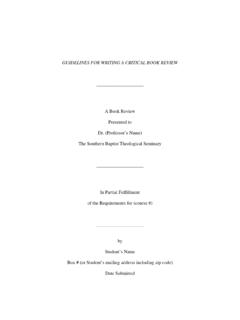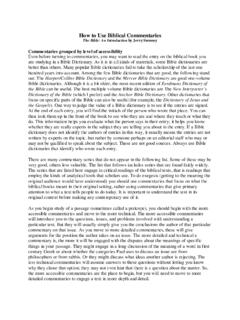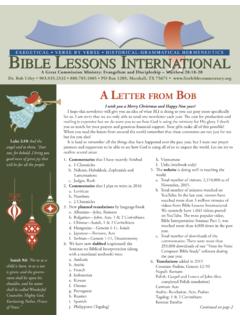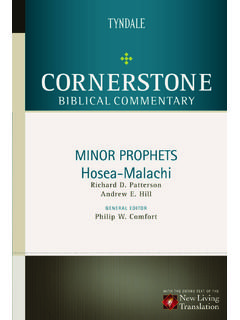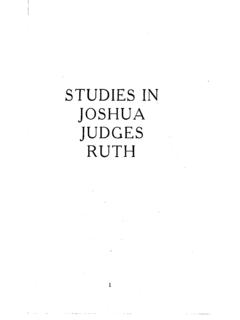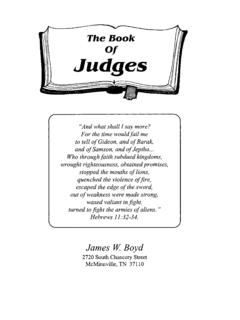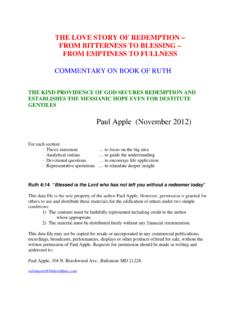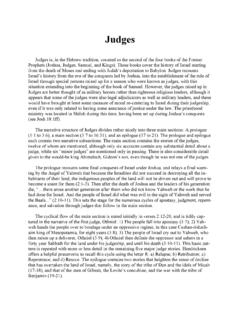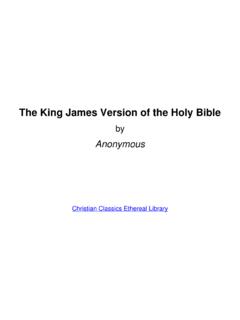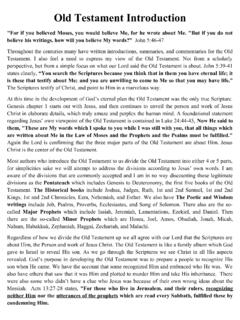Transcription of Evaluating Commentaries on Joshua
1 4 What is a Commentary?In its most basic sense, a commentary sim-ply makes comments on a text. In the bestcommentaries, these comments are notrandom or impressionistic statements thatmay or may not have a legitimate connec-tion with the meaning of the text at , they focus on the text, and onmaking the text s meaning achieve this goal usingdifferent tools. The first step is determin-ing which text is to be clarified. Manycommentators provide their own originaltranslation and textual notes, which ex-plain which ancient versions are beingfollowed. Others use an established En-glish translation as the basis for their com-ments.
2 The Commentaries written byWoudstra, Butler, Boling, Freedman, andNelson mentioned below provide anoriginal translation, while the others usean existing translation. The best commen-tators always refer to the original lan-guages in their research, however, and allthirteen works evaluated below do whose Hebrew skills are weakor who do not know Hebrew should notdespair. All the Commentaries recom-mended below can be used profitablyeven without such a knowledge; most ofthem refer to technical details in footnotes,endnotes, or special sections, and, whenHebrew is included in the text, it is usu-ally transliterated into Roman charactersand translated into Commentaries orient readers tothe manifold settings of the text.
3 These in-clude historical, archaeological, literary,and theological settings, at least. Know-ing the historical context of the events dis-cussed in a text and what light archaeo-logical excavations might shed on themis important for an expositor in establish-ing a proper framework for expositor should also have confidencein the historical accuracy of the text, andattention to the historical context can helpin this regard as well. The literary andtheological settings of the text concernhow it fits with the message of other bib-lical books and the major theological mo-tifs of the Commentaries then take readersthrough each passage, digging deep intothe content of the chapters, paragraphs,and verses.
4 They explain the meanings ofthe words, phrases, clauses, sentences,and paragraphs, and follow the flow oflogic in the text. They take readers backand forth between the forest and the trees, giving proper attention to thebroad sweep of the large literary units andthe theological messages at this level andalso to the details of the individual wordsand phrases. Such Commentaries alsoshow how each of two levels interactswith the many places, texts prove difficult tounderstand and interpretations vary. Thebest Commentaries discuss these issues,including at least the major alternativeinterpretations, and then lead readers toa reasoned can be broadly dividedinto three types: exegetical, homiletical,and devotional.
5 Exegesis can be definedas the practice of and the set of proce-dures for discovering the author s in-tended meaning, 1 and I have beendescribing exegetical Commentaries in theEvaluating Commentaries on JoshuaDavid M. Howard, M. Howard, Jr. is Professorof Old Testament at New Orleans Bap-tist Theological Seminary, a post he as-sumed after teaching at Bethel Seminaryin St. Paul, Minnesota and at TrinityEvangelical Divinity School in Deerfield,Illinois. His works include An Introduc-tion to the Old Testament HistoricalBooks (Moody Press) and numerousscholarly ar remarks. Homiletical (or preaching ) Commentaries are muchmore self-consciously focused upon mak-ing relevant applications of the text to themodern, contemporary world, and theycommonly refer to events, ideas, andmovements in contemporary culture.
6 Assuch, they often have an immediate rel-evance, but they also can become out-dated quickly as the culture changes. Mostsuch Commentaries are weak concerningthe exposition of the text s meaning, com-pared to exegetical Commentaries . Devo-tional Commentaries are often similar, buttheir focus usually is more individualis-tic. Often, they are very impressionistic,commenting at random on individualverses or portions of verses, but payinglittle or no attention to their recommend that pastors use exegeti-cal Commentaries in their sermon prepa-ration. If pastors learn well the message ofthe text, then many relevant applicationsshould naturally come to mind.
7 If homi-letical Commentaries are used, I recom-mend they be used to suggest relevantillustrations and make proper expositors, however, havingworked in depth on the text and consulteda few good exegetical Commentaries toflesh out their exposition (see below, on How to Use a Commentary ) will be in agood position to evaluate a commentary ssuccess at making proper application, thatis, application that faithfully arises from thetext at hand. Many points made in appli-cation of Biblical truths are certainly true,but in too many cases these points are notsupported by the texts cited. Expositorsfirmly rooted in the text itself, supportedby a few, high-quality Commentaries , willbe equipped to make proper and relevantapplication of the scriptures to their in-tended to Use a CommentaryEven the best Commentaries can bedangerous to expositors spiritual healthand exegetical skills.
8 Why is this? If com-mentaries become a substitute for theBible itself, then expositors have abdicatedtheir awesome responsibility of rightlydividing the word of truth (2 Ti 2:15).They have closed their minds to the richesof the Scriptures and have settled for apale imitation, someone s words temptation all too often for exposi-tors is to read the text once or twice andthen hurry to the Commentaries for theirinsights into the text. The sermon or les-son becomes a compilation of miscella-neous comments about what differentcommentators is far better for the expositor to readthe text 15 20 times, and then devote alarge portion of time to identifying the keysentences in each paragraph, key wordsand thoughts, the flow of ideas, and soforth.
9 After such extensive interaction,many questions and problems will haveanswered themselves, and the expositorwill have had the joy of discovery and in-ternalizing of the truths of the text in a waythat would not be possible by merely pe-rusing various , a few Commentaries can be con-sulted in order to shed light on remain-ing knotty questions, such as historicalcontext, literary and theological contexts,and possible textual difficulties. Goodcommentaries contain a wealth of suchinformation. However, expositors do notneed a commentary to help them state theobvious, such as This is what verse twosays. Expositors should develop theirown exegetical skills so that they can usecommentaries in those places where theycan truly be helpful, which will keep from6developing an unhealthy dependency onthem.
10 Commentaries should be tools ofexegesis, not Value of ExegeticalCommentariesThe best and most important exegeti-cal Commentaries on the book of Joshuaavailable to date are evaluated below. Notall of these are recommended for pur-chase, but they all are important works instandard commentary series, and pastorsand students will be well served by at leastknowing about each, the approaches eachtakes, and each s strengths and All can be consulted with recommend that pastors preachexpositionally through entire books of theBible (or portions of books, if the booksare extraordinarily lengthy) as their pri-mary approach to preaching.
